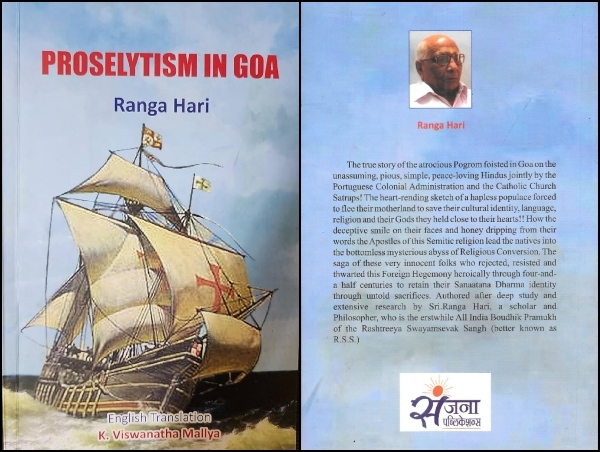The Unnerving Struggle to Remain A Hindu - I
21 Oct 2024 09:46:48
The article is based on "Proselytism in Goa" by Ranga Hari Ji
Goa was under Portuguese rule from 1510 to 1961. Even after our independence, it took approximately 14 long years to become part of Bharat. After such a long period, Goa has 66.08% of the Hindu population, and according to the 2011 census, the Christian population is 25%. The percentage of the Muslim population is a little more than 8.

The method used was somewhat different from British rulers. Hindus were not only denied the right to follow their religion but all the customs that had the slightest connection with religion were not allowed to be followed. Even the smallest details were noted and banned. They were aggressors, but the question the book raises is, why do we still don't want to shed the burden or baggage? Why can't the people see the design of our aggressors? Why it cannot be accepted that foreign rule destroyed everything indigenous? What we had, was the wisdom of centuries, why should we still not be in a position to return to our value system and our roots?
Reading the horrific details of the history is painful, generations after generations struggled to remain Hindus, in our land. They just did not surrender to the tyranny. We need to know this, remember the sacrifice of our people and now after independence, we ought to embrace the wisdom of our culture with great pride.
As stated by Dr Radhakrishnan, Hindus are not monotheists, never had war with religious goals, and are not intolerant to the extent of exterminating non-believers. Even Gandhi Ji too reiterated this fact.
Dr C I Issacin in his introduction to the book presented many points which make us contemplate. He pointed out that Shri Ranga Hari Ji differentiates the teachings of lord Jesus and the institution of the church, and never thought of vengeance ' after 451 years of sufferings '. He stated that the book is based on 'authentic records '. The demolition of temples, the ordeal Hindus had to undergo, the destruction of the holy Hindu scriptures and many more that made the life of Hindus a hell, all such points are based on reliable evidence.
He accepted that doubts are bound to occur when one reads about the role of Francis Xavier in the utterly ' cruel deeds and his attaining the stature of a saint '. He finds these doubts ' well-founded '.
The horrifying details of the Inquisition make even ' a brave to shudder ', he accepted. He described the procedure of the Inquisition in Goa, which surpasses the third degree by police too. Dr Issac acknowledges that the book would help the young generation to ' learn and understand ' the dark period of the church as an institution. Dr Issac expected the Church ( as an institution ), to' ask for forgiveness for the barbarism their predecessors indulge in'. He referred to The Pope's request for forgiveness for the atrocities by the church on the ordinary people of Africa and Latin America and Pope Benedict, requesting pardon from Israelis. He raises the question, why The Pope did not attempt to beg for forgiveness for atrocities imposed on Hindus of Goa?
He also observed that the Hindu scriptures were burnt but they were imprinted on the hearts of devotees, thus could not erase the faith and the scriptures can be preserved. (Probably a reference to the tradition of learning by rote ).
There is a reference to the very unique tradition of ' transferring the divine spirit infused into an idol ' , by Dr Issac. Thus the objects into which the divine spirit was transferred, were moved away from the reach of the rulers and the church authority. This was the way they were saved and resurrected later when the temples were built again.
He accepted that even after conversion, old Hindu practices are still followed by converts. He stated that once the external pressure disappears the differences are bound to thin out.
He is not in support of the attempt by intellectuals to 'play hide and seek with the distorted pseudo secular slogans '.
He put his thoughts across without mincing his words and in unambiguous terms. His introduction is worth reading.
We need to learn lessons and it should be followed by course correction.